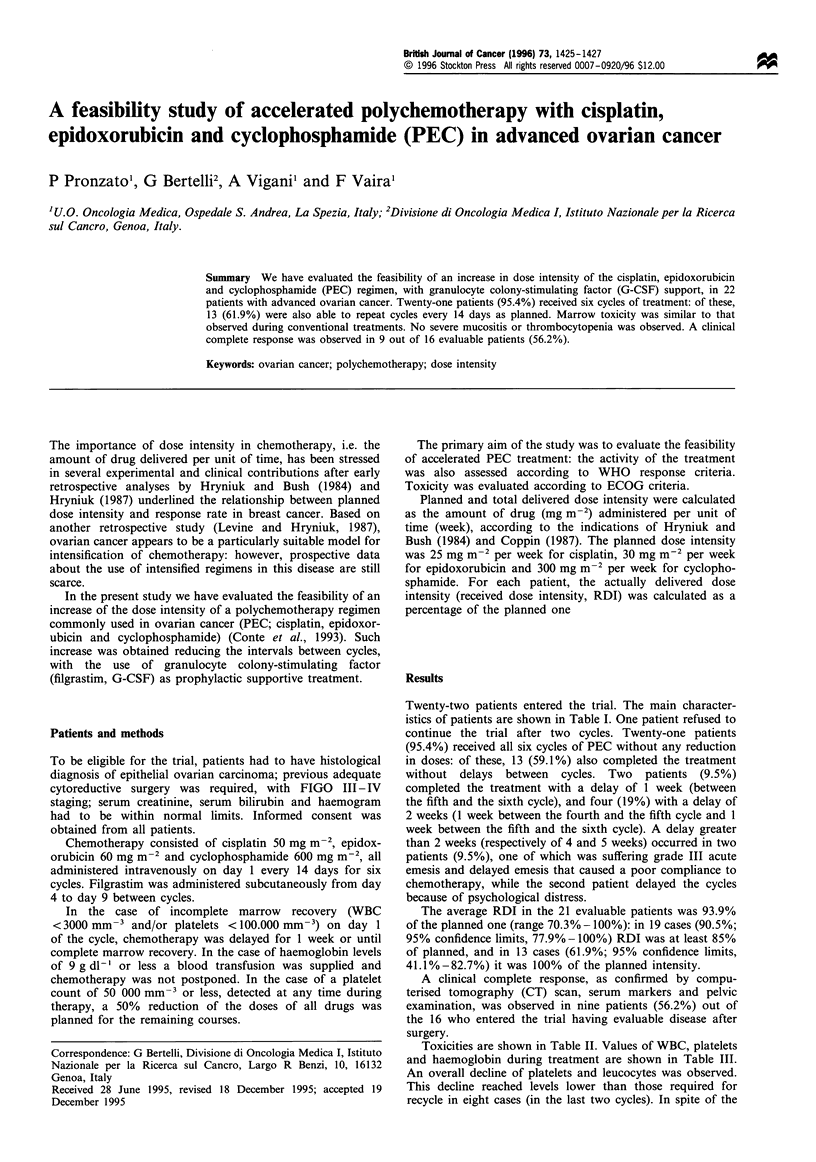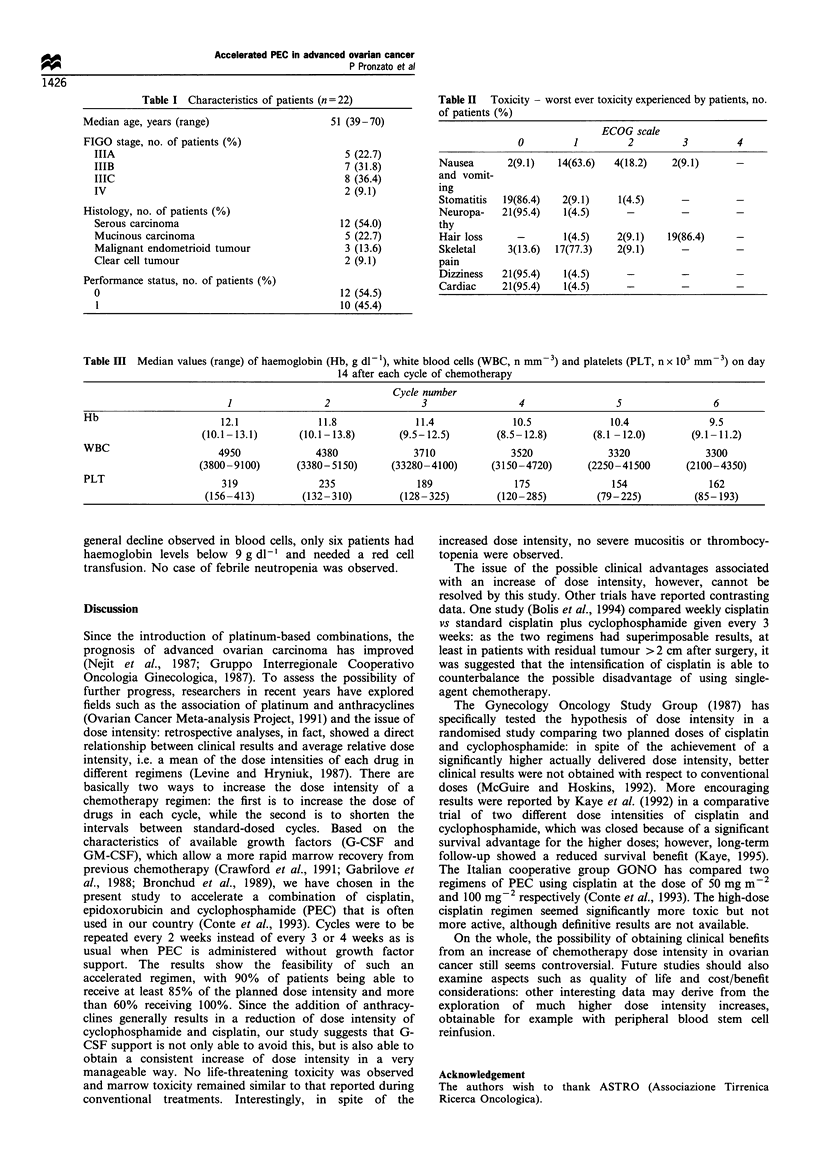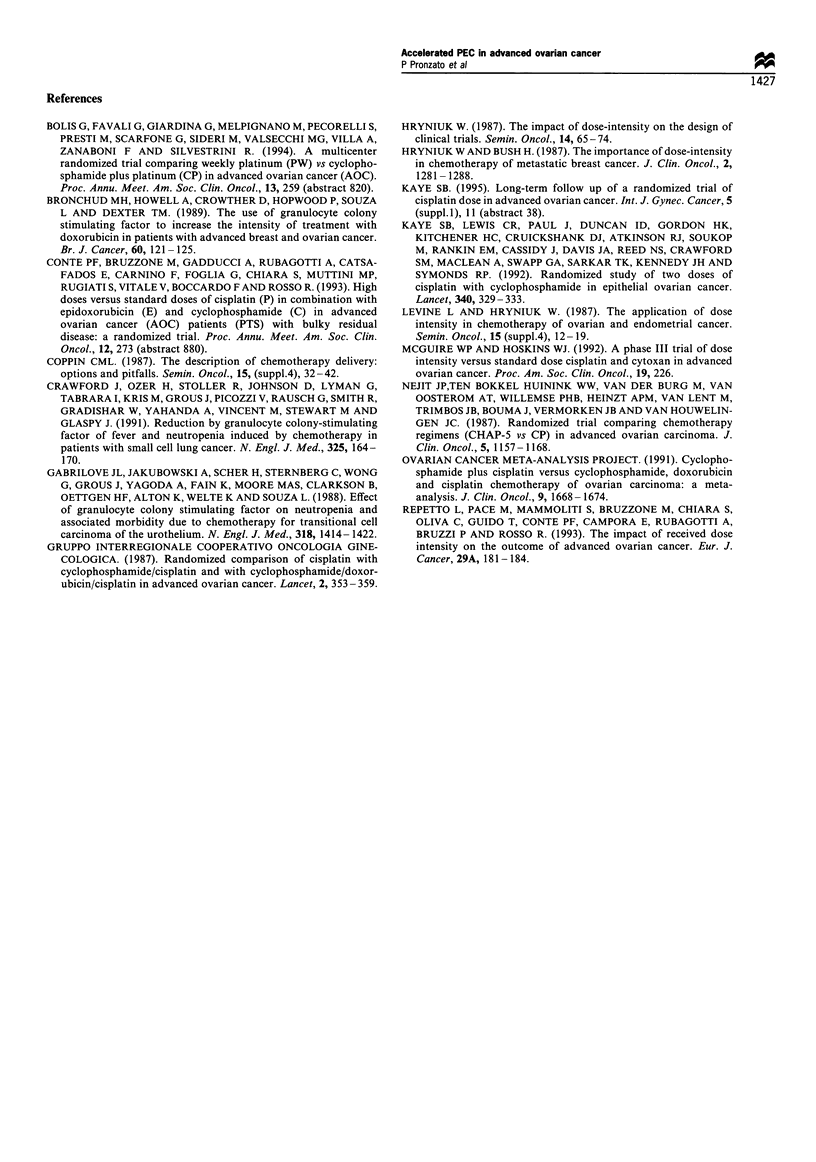Abstract
We have evaluated the feasibility of an increase in dose intensity of the cisplatin, epidoxorubicin and cyclophosphamide (PEC) regimen, with granulocyte colony-stimulating factor (G-CSF) support, in 22 patients with advanced ovarian cancer. Twenty-one patients (95.4%) received six cycles of treatment: of these, 13 (61.9%) were also able to repeat cycles every 14 days as planned. Marrow toxicity was similar to that observed during conventional treatments. No severe mucositis or thrombocytopenia was observed. A clinical complete response was observed in 9 out of 16 evaluable patients (56.2%).
Full text
PDF


Selected References
These references are in PubMed. This may not be the complete list of references from this article.
- Bronchud M. H., Howell A., Crowther D., Hopwood P., Souza L., Dexter T. M. The use of granulocyte colony-stimulating factor to increase the intensity of treatment with doxorubicin in patients with advanced breast and ovarian cancer. Br J Cancer. 1989 Jul;60(1):121–125. doi: 10.1038/bjc.1989.234. [DOI] [PMC free article] [PubMed] [Google Scholar]
- Crawford J., Ozer H., Stoller R., Johnson D., Lyman G., Tabbara I., Kris M., Grous J., Picozzi V., Rausch G. Reduction by granulocyte colony-stimulating factor of fever and neutropenia induced by chemotherapy in patients with small-cell lung cancer. N Engl J Med. 1991 Jul 18;325(3):164–170. doi: 10.1056/NEJM199107183250305. [DOI] [PubMed] [Google Scholar]
- Gabrilove J. L., Jakubowski A., Scher H., Sternberg C., Wong G., Grous J., Yagoda A., Fain K., Moore M. A., Clarkson B. Effect of granulocyte colony-stimulating factor on neutropenia and associated morbidity due to chemotherapy for transitional-cell carcinoma of the urothelium. N Engl J Med. 1988 Jun 2;318(22):1414–1422. doi: 10.1056/NEJM198806023182202. [DOI] [PubMed] [Google Scholar]
- Hryniuk W. M. Average relative dose intensity and the impact on design of clinical trials. Semin Oncol. 1987 Mar;14(1):65–74. [PubMed] [Google Scholar]
- Hryniuk W., Bush H. The importance of dose intensity in chemotherapy of metastatic breast cancer. J Clin Oncol. 1984 Nov;2(11):1281–1288. doi: 10.1200/JCO.1984.2.11.1281. [DOI] [PubMed] [Google Scholar]
- Kaye S. B., Lewis C. R., Paul J., Duncan I. D., Gordon H. K., Kitchener H. C., Cruickshank D. J., Atkinson R. J., Soukop M., Rankin E. M. Randomised study of two doses of cisplatin with cyclophosphamide in epithelial ovarian cancer. Lancet. 1992 Aug 8;340(8815):329–333. doi: 10.1016/0140-6736(92)91404-v. [DOI] [PubMed] [Google Scholar]
- Levin L., Hryniuk W. The application of dose intensity to problems in chemotherapy of ovarian and endometrial cancer. Semin Oncol. 1987 Dec;14(4 Suppl 4):12–19. [PubMed] [Google Scholar]
- Neijt J. P., ten Bokkel Huinink W. W., van der Burg M. E., van Oosterom A. T., Willemse P. H., Heintz A. P., van Lent M., Trimbos J. B., Bouma J., Vermorken J. B. Randomized trial comparing two combination chemotherapy regimens (CHAP-5 v CP) in advanced ovarian carcinoma. J Clin Oncol. 1987 Aug;5(8):1157–1168. doi: 10.1200/JCO.1987.5.8.1157. [DOI] [PubMed] [Google Scholar]
- Repetto L., Pace M., Mammoliti S., Bruzzone M., Chiara S., Oliva C., Guido T., Conte P. F., Campora E., Rubagotti A. The impact of received dose intensity on the outcome of advanced ovarian cancer. Eur J Cancer. 1993;29A(2):181–184. doi: 10.1016/0959-8049(93)90169-g. [DOI] [PubMed] [Google Scholar]


